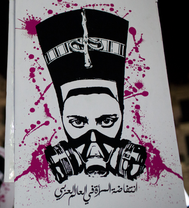 Women protest in Egypt, 2013
Women protest in Egypt, 2013 Because of this common remark I am often wary of any feminist project that involves using traditionally male techniques to bring down certain men. Such as suggestions that The Sun has a male Page 3 model. It's too simplistic, too obvious. When it does work though, for instance the image of male superheroes in female superheroposes? It's fantastic. Why does it work? Because it both highlights the ridiculousness of the images and gets people talking.
| In the spirit of turning something on its head in Egypt a new Twitter hashtag is trending. It translates roughly as "we will harass men" or "we will sexually harass men". | Can a hashtag at least get people to question why it has appeared? |
It shows how much concern there is for women's safety, no? Maybe a Twitter hashtag from on the ground carries more weight. Recently in Egypt - it is not clear when - an apparent sexual assault and the stripping of a 19 year old woman in Tahrir Square was recorded and the graphic video* released on YouTube. Since the 2011 revolution in Egypt there have been many reports of sexual violence against women in Tahrir Square.
The tongue in cheek hashtag #wewillharassmen gives reasons for how men are asking for it by wearing tight jeans or neglecting to wear a veil. It has had opposition, with tweets from men that say the hashtaggers are "...disgusting. What a stinky women-orientated society". A woman who seems to share my misgivings about such techniques tweeted to say "I dislike this hashtag, you can't solve a problem with the same level of thinking that created it".
But no one is paying attention. Not even a Hollywood star or the British government seems to be able to draw attention to the problem of sexual violence. Can a hashtag at least get people to question why it has appeared? #WeWillSee...
Squeamish Kate
*The woman has asked for the video to be taken down, this links to a report and description of the video with clips.


 RSS Feed
RSS Feed
